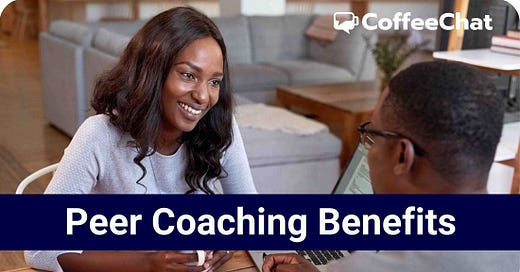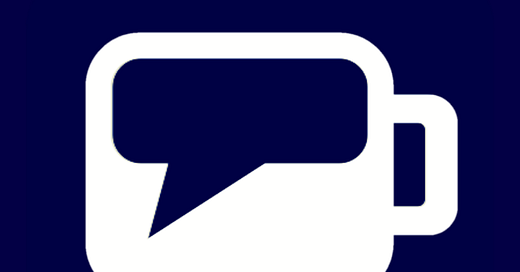
Hi everyone, here’s what we have for you this week:
How can you future-proof your career as a leader? In this week’s episode of The Everyday Leader, Catherine Njeri shares her experience building empathy as a Key Account Manager at Cellulant, a leading African fintech company.
Peer coaching helps build a habit of asking powerful questions. We share 3 ways in which peer coaching can transform your leadership.
Looking to re-aligning with your career goals in 2022? Join Arnold in his free group coaching session this month about identifying an optimal role using the Ikigai framework.
Read on for more details…
Shaping your story to mobilize, finding ways to identify blindspots, and future-proofing your career by developing a mix of soft skills and industry expertise
Here are a few highlights from the conversation with Catherine:
Know who you’re selling to, and shape the story around their needs: Before enrolling in the African Leadership University, Catherine was living with her parents in Nairobi. She grew frustrated by the lack of local government support in cleaning up the streets near her neighborhood. When her mother challenged her to stop complaining and do something about it, she embarked on her first leadership journey. During her various attempts at building support for her initiative, she came to learn how to approach and mobilize each type of stakeholder based on their own incentives. For example, she used a different selling point to convince the local city council to allocate resources compared with mobilizing local community members for a clean-up day. Her efforts brought about lasting change and also bolstered her confidence.
Find ways to identify blindspots and self-correct early on: When Catherine held several internships with Cellulant during her university years, one specific learning was around the importance of email etiquette. While it seemed like a small, trivial detail to her given how easily she engaged with professors over email, Catherine received mentorship on how best to introduce herself and ask questions over email to staff from other departments whom she’s didn’t yet know. Her ability to be open to this feedback and make changes enabled her to navigate the company culture and transition into a full time role after graduation.
Future-proof your career by developing a mix of soft skills and industry expertise: Catherine has spent the past year developing empathy for her key accounts’ clients and strengthening her coordination skills as she addresses the day-to-day challenges and opportunities in her role as they arise. She also puts deliberate focus on building her hands-on experience and knowledge of dozens of countries’ fintech landscapes across Africa, which will position herself as a thought leader in the fintech sector, one of the fastest growing areas of the economy.
Building your peer coaching skills is a good investment of your time and effort. Coaching is an important method of management in order to help your team identify solutions and motivate them to perform. If you develop strong peer coaching skills, this will be a superpower you can use even during a quick encounter with a team member at work. Here are three ways this shows up clearly:
Learn how to ask powerful questions: An underlying assumption a peer coach should use is that the participant already has all of their potential answers inside of them - and it's asking the right questions that will unlock them. As a result, peer coaches mostly focus on asking questions designed to inspire the participant to look at their challenges and opportunities from a different perspective. Developing a knack for asking powerful questions at the right time and place can generate tremendous impact during strategic leadership discussions.
Improve your ability to listen without a filter: You spend a good chunk of your life listening to others. And at the same time you're listening, you're often also making lots of pre-judgements in your head that help you analyze the information you're receiving and prepare to respond. This real-time internal analysis can be quite helpful in order to be efficient throughout your day and respond quickly in cases of emergencies. Peer coaching provides an opportunity to learn to better listen from a perspective of curiosity without pre-judgements, in order to notice more details of how the individual is presenting their situation.
Discover hidden potential talent and ideas: During peer coaching, participants do most of the talking while the peer coach is mostly asking questions. While there is a space for the peer coach to share some ideas related to their experience facing a similar challenge, it's almost always better to keep this limited and keep the focus on asking questions so that the participant can move forward. It can be naturally tempting for the peer coach to jump in and try to share tips and solutions in order to solve or fix the issue that the participant is discussing, but its much better to give the participant a chance to learn more about themselves through reflection about how they are problem solving themselves. In this way, the peer coach is exposed to new types of thinking and may stumble across innovative ideas or otherwise underestimated team members.
The CoffeeChat peer coaching network pairs you with a different peer coach for a new session each month. While there will be new a context to grasp each time, this is by design. This rotational model gives you the opportunity to speak to a variety of individuals working across many different teams and thus regular exposure to a range of different perspectives. Further, by practicing peer coaching with new individuals on a regular basis, you'll stress-test your ability to adapt your coaching style to new environments and personalities.
Even more, developing a coaching mindset as an individual and building a coaching culture across a team means tackling challenges both large and small with a curious, empathetic and focused approach that produce better results and more rewarding careers. Needless to say, all of this can play a significant role in increasing team retention, productivity and staff satisfaction levels.
Coach Arnold will host a group career coaching session on Wednesday, 26 January. He shares:
Only 15% of the world’s full-time professionals are enthusiastic about their work as per a Gallup research. Like most of us, we treat our careers and job search as an iterative process with every subsequent job, we sought a little more of what we liked in my previous role, and little less of what we didn’t like. With the Ikigai framework, Arnold guides you to a simple and elegant solution for assessing where you are in your career/ job search and determining what pivots to make based on a more long term outlook.
Please share with anyone who you think could benefit from attending.









